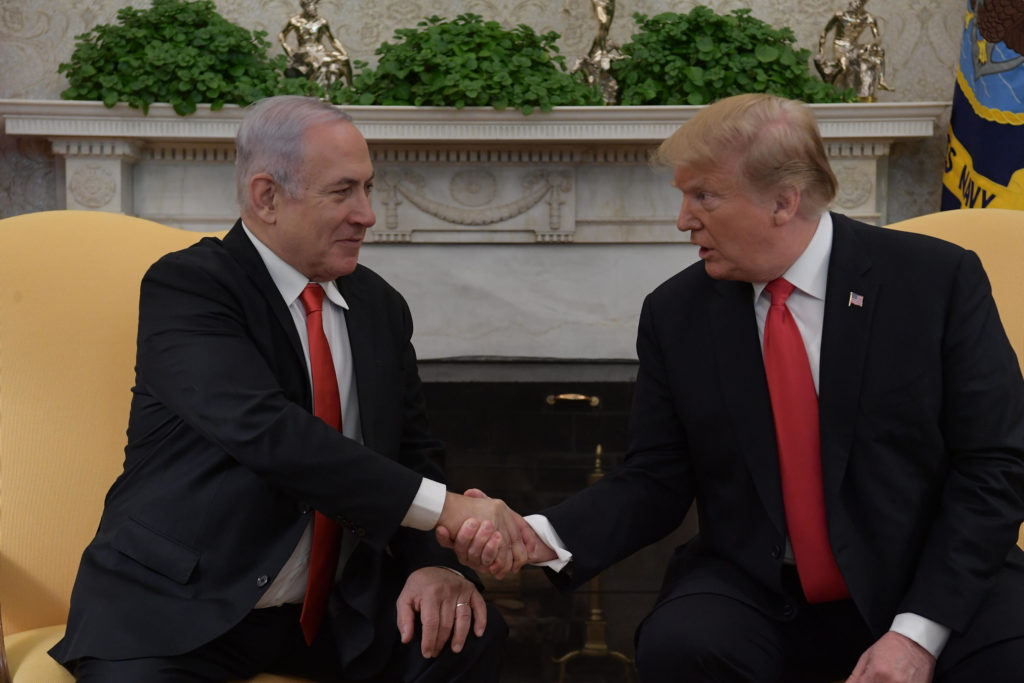
The United States’ election day is Tuesday, but Israel has good reasons to watch from an ocean away to find out who the next US president will be. From Iran policy to relations with peace process partners, there are real differences between incumbent President Donald Trump and his opponent, former-Vice President Joe Biden. Here is a quick look at some of the candidates’ key views on the Middle East.
Donald Trump
President Trump is finishing up what may be the most pro-Israel four-year term in American history. He became the first US President to formally recognize Jerusalem as the capital of Israel, moving the US embassy there from Tel Aviv. President Trump also set a historic precedent by recognizing Israeli sovereignty over the Golan Heights, which Israel claimed after the 1967 defensive war against Syria. There was even discussion of possibly recognizing Israeli sovereignty over Judea and Samaria, which Palestinians claim as the West Bank, although that appears to have been taken off the table at this time.
Despite Trump’s support of Israeli positions, he managed to nonetheless convince three Arab nations to reach historic peace agreements with Israel: the United Arab Emirates, Bahrain and Sudan. The peace deals were achieved partly by dropping the aforementioned prospect of recognizing Israeli sovereignty over Judea and Samaria, but Israel was apparently willing to make the exchange for the first modern Israel-Arab peace deals that didn’t involve Israel formally withdrawing from territory.
But peace isn’t the only focus for President Trump in the region—addressing Iran’s threat to the region has been a priority as well. First, President Trump insisted on incorporating Iran’s missile program into the Iran nuclear deal. When that effort was rebuffed, Trump pulled the Americans out of the 2015 nuclear accord known as the Joint Comprehensive Plan of Action (JCPOA). Since then, the US has led the way on imposing devastating sanctions on Iran, crippling the economy of the world’s leading sponsor of terrorism. Trump also greenlighted the assassination of Iranian spymaster Maj. Gen. Qasem Soleimani, a key cog in Iran’s policy of regional aggression.
And it is that last area, the American approach to Iran, that stands as the most likely Middle East policy to change if Joe Biden wins the White House.
Joe Biden
After serving for eight years as Vice President for former-US President Barack Obama, on top of decades of as a US senator, there is little uncertainty about Biden’s plans regarding Iran—and the Democrat hasn’t tried to hide them. On the Joe Biden website, he makes it clear that if elected he would re-enter the Iran nuclear deal “if Tehran returns to compliance with the deal.” While Biden makes vague comments about intentions to “strengthen and extend” the accord, the current reality is that the nuclear deal has recently allowed Iran to start buying and selling weapons and is actually set to sunset certain nuclear restrictions in 2026 and 2031.
Subtly, Biden also plans to step back from efforts to fight Iranian proxies. On his website, he specifically notes that he would “end our support” for the Saudis’ war in Yemen against the Iranian-backed Houthis group. The Council on Foreign Relations (CFR) website summarizes Biden’s view as even stronger anti-Saudi, calling for an end of arms sales to what has been a key US ally in the Middle East, with the change coming for human rights reasons. That could also hamper efforts to achieve peace between Israel and more Arab nations, as the Saudis are a highly influential nation in the Arab world and perhaps might even consider peace with Israel themselves under the right conditions.
As for Israel, Biden’s former partner—President Obama—took a hardline approach to Israeli settlements, even abstaining on a United Nations Security Council resolution condemning the Israeli enterprise. However, The Times of Israel has reported that former US administration officials claimed that Biden was opposed to the US permitting the UN condemnation.
On his website, Biden promises to sustain an “ironclad commitment to Israel’s security”, and his top foreign policy advisor, Tony Blinken, told The Times of Israel that Biden has supported and would continue to support Arab normalization with Israel. The CFR summary of Biden’s foreign policy said he would keep the US embassy in Jerusalem as well. As for the peace process, Blinken said Biden backs the two-state solution, but recognizing Palestinians and Israelis aren’t ready to sit down for peace talks right now, the former Vice President would instead try to prevent steps that would make a peace deal harder to reach.
That would contrast with Obama, who made Israel-Palestinian peace a high foreign policy priority early in his administration. Yet, ironically, it was during Obama’s tenure that the Palestinians stopped peace talks with Israel and haven’t restarted them since. Malkah Fleisher, wife to Hebron spokesman Yishai Fleisher and a regular contributor to Fleisher’s podcast, tweeted an article from The Times of Israel claiming the Palestinians are hoping for a Biden win. “The Palestinian Authority wants Biden. That’s all you really need to know,” tweeted Malkah.
In the end, some things are unlikely to change in the US-Israel relationship regardless of who wins the American presidential elections on Tuesday—the US and Israel will remain allies, and the US will likely continue to back Israel’s security.
But the US approach to Iran would definitely be different, and it’s unclear if Trump’s progress in Middle East peace would continue under new management—especially if Biden shuns the influential Saudis. That could be welcome news to the Palestinians, who have so far rejected Trump’s approach to Middle East peace. It also sounds as though Biden may take a tougher stance on Israel than Trump, but not as strong as former President Obama.
This week, Americans will cast the remaining ballots that will decide if Trump or Biden leads the United States for the next four years. But Israel will be one of many non-American places impacted by who wins.
(By Joshua Spurlock, www.themiddleastupdate.com, November 1, 2020)
